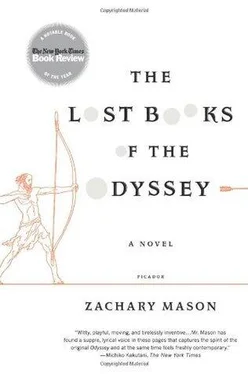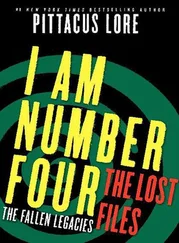I lay listening to the hissing of the bow wave and tried to tell the future. The ship will dock and I will set foot on the wharf for the first time in ten years. I will walk up through the harbor and see my father’s father’s house standing there on the hill. And what then? Images flickered through my mind. The face of a young woman, her suspicion turning to welcome. The creak of a bowstring. An island far away and bound in darkness, a woman’s shadow moving over its hills. I stared up at the lightening sky and imagined that the contours of the bluing intricate clouds, just visible, were a map of the near future.
My birthrights were great strength, copper beauty and an enduring sadness. My mother Thetis told me I could not die and indeed though the years withered men like autumn leaves I persisted. Just as my body stayed young, so did my temperament — I wandered from Gaul to India and back, taking great delight in seeking out the best fighters and cutting them down. One year a new star appeared in the sky and I decided to go to the imperial court and appropriate its significance for myself before the astrologers arrogated it to flood, locusts or plague. I won an audience with Emperor Agamemnon by thrashing the sixteen spearmen who stood scowling before his summer palace. I sketched the shadow of a bow, smiled up into his darkening countenance and proposed a wager. I would engage his two greatest champions both at once — if they won, I would be his slave and set his perfumed foot on the necks of nations, but if I won I would loot what I liked from his palace. The vizier Odysseus whispered worriedly in His Imperial Highness’s ear but Agamemnon brushed him aside, smiled at me hatefully and summoned his paladins — Ajax, built like a mountain, who drew his strength from the deeps of the earth, and Diomedes, who was so fast he moved in a blur and had crossed blades with the gods.
The fight would have been disappointing had there not been the emperor’s impotent fury for relish. When I tired of the hollow sound of their skulls knocking together I dumped them before the throne and claimed my rights. I loudly announced that I would start my pillaging in the harem and strode straight past the eunuchs with their cruelly barbed halberds and up the long stairs to the high tower where Agamemnon, ever fearful of cuckolding, kept his women.
I had not meant to do more than provoke him into seeking out the greatest champions to kill me — that way I would know once and for all if I had any equal in the world. Agamemnon lacked invention — it must have been Odysseus who advised him to weld shut the doors to the harem tower that first night while I was distracted. The walls were five feet thick and the windows no wider than arrow slits. There was no way to get to the roof and no way out except the fused iron doors — I was stuck. The girls must have been expensive, as they kept passing in food and water. They were a delight at first, but soon became tiresome — always a hothouse of intrigue and gossip, the harem’s suddenly absolute isolation brought out an absolute cattiness. There was nothing to do but practice the sword and meditate, day in and day out.
A year and a day after I had been locked inside the harem there was a shriek of metal and I went down to find them prying open the door to my prison. Odysseus was there holding a white flag of truce. Behind him were fifty men with nets and bolos and a hundred archers with what I could tell even at a hundred paces were poison-tipped arrows. Odysseus apologized for the mixed reception — he had wanted to talk to me but Agamemnon would not permit the gate to be opened without all this, he said, gesturing toward the pale, trembling soldiers behind him. He sat down beside me on the stairs and poured arak from a copper flask. I had not tasted spirits since my confinement and drank happily. Odysseus said he thought that I had come to court not so much for conquest as in hopes of finding a worthy enemy. If this was the case, I was bound to be disappointed — the late Ajax, undefeated prior to his death at my hands, was the strongest the empire had to offer. I could always set myself single-handed against all the emperor’s armies but at best that would be like a lion fighting a swarm of biting ants.
He said I had chosen poorly by going to the harem — had I gone to the treasury instead I might have found the secret panel set in the floor that led to a maze of caverns in one of which there was a cedar chest guarded by tiny white spiders (their poison of staggering virulence) and within that chest found what he had brought me today, a small key of black and twisted iron. This was the key, he told me, that opened the gate the gods had locked behind them when they tired of the world and finally left it to its own devices. It had been held close by the Atreides dynasty since time out of mind, as much to keep the gods out as mortals in. Odysseus freely admitted that he wanted me out of the empire but said that the only way to do this was to see that I got what I wanted elsewhere — he told me to go and seek a match among the gods because I would not find it among men.
I set out for the iron gates of heaven, which as is widely known are a thousand miles north and a thousand miles east of the mountaintop grave of the philosopher Lao Tsu. In time I found them, set in a high glacier on a mountain peak where blizzards never let up shrieking.
I unlocked the great black iron door with Odysseus’s key and opened it onto a staircase that led up indefinitely into a still, starry night. I trudged upward for some indeterminate duration, the night unchanging around me. (I still don’t know how long it took. Now and then my mind would turn from the task of putting one foot in front of the other but I pulled myself back from the brink of reflection, knowing it would lead to despair.) At last I reached the top and found a silver gate that was the twin of the iron one, though it had been so long since I left the Earth (it was invisible behind me and had been time out of mind) that I wondered if the first gate had been a dream. I smashed the silver gate with my fist and burst in on an astonished heavenly bureaucracy, blue-skinned ministers of celestial protocol gaping at me from between their desks’ towers of memoranda. For all their surprise, retaliation was swift and comprehensive — slavering, white-tusked demons bayed insults and hurled burning brands, a grim-faced god with the Milky Way in his quiver shot stars at me and mad-eyed devas attacked from all sides at once and no side at all, and through it all the Emperor of Heaven for whom the world and all the worlds were as baubles in his hand did not deign to turn his august eyes in my direction. Here, finally, was true power to oppose me but to my lasting sorrow I had forgotten what failure was and my blade flickered through the hearts of my antagonists until I came before the Emperor of Heaven who continued to disdain me even as I cut through his excellent jade neck. He came crashing down from his high throne, mountain ranges wearing away on the distant Earth as he fell and fell and fell. Now I have taken his throne and read his book and the now-docile devas flit about my shoulders, waiting, perhaps forever, for me to impart my wisdom, which is that I have learned nothing, know nothing, wish I had never picked up a sword, left my hut, been born.
An arrow, a reaver, a ship, a wave, a cold swell, a white fog — death was destined to come from the sea for Odysseus Laertides and in the fullness of time it did. He had often meditated on the form it would take and thought he had considered and prepared himself against every seaborne end but in the event dying was confusing, a jumble of impressions of foam and blood and long empty vistas. He was relieved to see that Athena, who had abandoned him for decades and, he had thought, for good, was there to greet him and gather him to her breast (he had never before been this close to her, never touched her — her skin was very hot and she smelled like metal and summer). She grinned at him like she had when they were plotting an especially pernicious piece of mischief and said she had been waiting for him for a long time, poised for the moment when his thread would be cut and she would swoop down from Olympus to catch his soul before it could start the long trip into the dark. The underworld was not for him, not even its Elysium, she said. For Odysseus, her best beloved among mortals, her favorite since he was born, she would, as his final reward, make for him whatever afterlife he wanted.
Читать дальше












